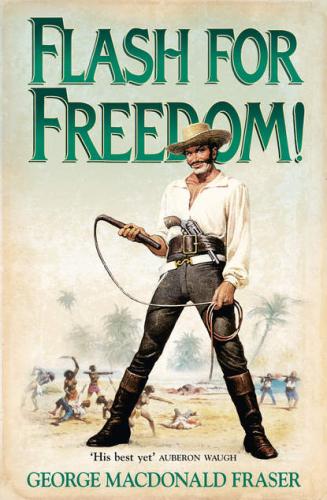Contents
Copyright
How Did I Get the Idea of Flashman?
Dedication
Explanatory Note
Notes
About the Author
The FLASHMAN Papers: In chronological order
The FLASHMAN Papers: In order of publication
Also by George MacDonald Fraser
About the Publisher
When the first two packets of the Flashman Papers were published, in 1969 and 1970, there was some controversy over their authenticity. It was asked whether the papers were, in fact, the true personal memoirs of Harry Flashman, the notorious bully of Tom Brown’s Schooldays and later an eminent British soldier, or were simply an impudent fake.
This was not a controversy in which either Mr Paget Morrison, the owner of the papers, or I, his editor, thought fit to join. The matter was thoroughly discussed in various journals, and also on television, and if any doubters remain they are recommended to study the authoritative article which appeared in the New York Times of July 29, 1969, and which surely settles the question once and for all.
The first two packets of the papers contained Flashman’s personal narrative of his expulsion from Rugby School by Dr Thomas Arnold, his early service in the British Army (1839–42), his decoration by Queen Victoria after the First Afghan War, and his involvement in the Schleswig-Holstein Question, in which he found himself pitted against the young Otto von Bismarck and the celebrated Countess of Landsfeld. The third packet, which is now presented to the public, continues his story in the year 1848 and the early months of 1849. It is remarkable as a first-hand account of an important social phenomenon of the early Victorian years – the Afro-American slave trade – and in its illumination of the characters of two of the most eminent statesmen of the century, one a future British Prime Minister and the other a future American President. Flashman’s recollections cast interesting light on what may be called their formative years.
When the Flashman Papers were brought to light at Ashby, Leicestershire, in 1965, it was noted that while the great volume of manuscript had obviously been examined and re-arranged round about 1915, no alteration or amendment had been made to the text as set down by Flashman himself in 1903–1905. Closer examination of the third packet reveals, however, that an editorial hand has been lightly at work. I suspect that it belonged to Grizel de Rothschild, the youngest of Flashman’s sisters-in-law, who with a fine Victorian delicacy has modified those blasphemies and improprieties with which the old soldier occasionally emphasised his narrative. She was by no means consistent in this, for while she paid close attention to oaths, she left untouched those passages in which Flashman retails his amorous adventures; possibly she did not understand what he was talking about. In any event, she gave up the task approximately half way through the manuscript, but I have left her earlier editing as it stands, since it adds a certain period charm to the narrative.
For the rest, I have as usual inserted occasional explanatory notes.
G.M.F.
I believe it was that sight of that old fool Gladstone, standing in the pouring rain holding his special constable’s truncheon as though it were a bunch of lilies, and looking even more like an unemployed undertaker’s mute than usual, that made me think seriously about going into politics. God knows I’m no Tory, and I never set eyes on a Whig yet without feeling the need of a bath, but I remember thinking as I looked at Gladstone that day: ‘Well, if that’s one of the bright particular stars of English public life, Flashy my boy, you ought to be at Westminster yourself.’
You wouldn’t blame me; you must have thought the same, often. After all, they’re a contemptible lot, and you’ll agree that I had my full share of the qualities of character necessary in political life. I could lie and dissemble with the best, give short change with a hearty clap on the shoulder, slip out from under long before the blow fell, talk, toady, and turn tail as fast as a Yankee fakir selling patent pills. Mark you, I’ve never been given to interfering in other folks’ affairs if I could help it, so I suppose that would have disqualified me. But for a little while I did think hard about bribing my way to a seat – and the result of it was that I came within an ace of being publicly disgraced, shanghaied, sold as a slave, and God knows what besides. I’ve never seriously considered politics since.
It was when I came home from Germany in the spring of ’48, after my skirmish with Otto Bismarck and Lola Montez. I was in d----d bad shape, with a shaven skull, a couple of wounds, and the guts scared half out of me, and all I wanted was to go to ground in London until I was my own man once more. One thing I was sure of: nothing was going to drag me out of England again – which was ironic, when you consider that I’ve spent more than half of the last fifty years at the ends of the earth, in uniform as often as not, and doing most of my walking backwards.
Anyway, I came home across the Channel one jump ahead of half the monarchs and statesmen in Europe. The popular rebellion I’d seen in Munich was only one of a dozen that broke out that spring, and all the fellows who’d lost their thrones and chancellorships seemed to have decided, like me, that old England was the safest place. So it proved, but the joke was that for a few weeks after I came home it looked touch and go whether England didn’t have a revolution of her own, which would have sold the fleeing monarchs properly, and serve ’em right.
Mind you, I thought it was all gammon myself; I’d just seen a real rebellion, with mobs chanting and smashing and looting,
